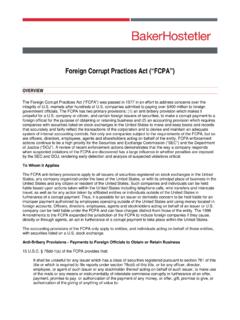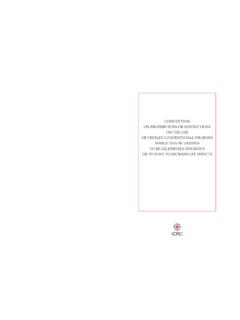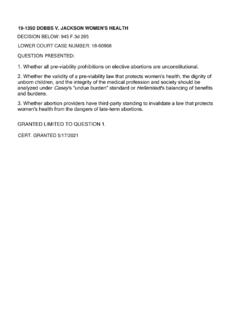Transcription of List of Prohibited Acts During the Election Period COMELEC ...
1 List of Prohibited Acts During the Election Period COMELEC , Philippines. List of Prohibited Acts During the Election Period . Found at: and ( Election Code of the Philipinnes) Omnibus Election Code of the Philipinnes Article XXII Election OFFENSES Section Guide Sec. 261. Prohibited Acts Sec. 262. Other Election Offenses Sec. 263. Persons criminally liable Sec. 264. Penalties Sec. 265. Prosecution Sec. 266. Arrests in connection with the Election campaign Sec. 267. Prescription Sec. 268. Jurisdiction of courts Sec. 269. Preferential disposition of Election offenses Section Details Sec. 261. Prohibited Acts. - The following shall be guilty of an Election offense: a. Vote-buying and vote-selling. 1. Any person who gives, offers or promises money or anything of value, gives or promises any office or employment, franchise or grant, public or private, or makes or offers to make an expenditure, directly or indirectly, or cause an expenditure to be made to any person, association, corporation, entity, or community in order to induce anyone or the public in general to vote for or against any candidate or withhold his vote in the Election , or to vote for or against any aspirant for the nomination or choice of a candidate in a convention or similar selection process of a political party.
2 2. Any person, association, corporation, group or community who solicits or receives, directly or indirectly, any expenditure or promise of any office or employment, public or private, for any of the foregoing considerations. b. Conspiracy to bribe voters. - Two or more persons, whether candidates or not, who come to an agreement concerning the commission of any violation of paragraph (a) of this section and decide to commit it. c. Wagering upon result of Election . - Any person who bets or wagers upon the outcome of, or any contingency connected with an Election . Any money or thing of value or deposit of money or thing of value situated anywhere in the Philippines put as such bet or wager shall be forfeited to the government. d. Coercion of subordinates. 1. Any public officer, or any officer of any public or private corporation or association, or any head, superior, or administrator of any religious organization, or any employer or land-owner who coerces or intimidates or compels, or in any manner influence, directly or indirectly, any of his subordinates or members or parishioners or employees or house helpers, tenants, overseers, farm helpers, tillers, or lease holders to aid, campaign or vote for or against any candidate or any aspirant for the nomination or selection of candidates.
3 2 .Any public officer or any officer of any commercial, industrial, agricultural, economic or social enterprise or public or private corporation or association, or any head, superior or administrator of any religious organization, or any employer or landowner who dismisses or threatens to dismiss, punishes or threatens to punish be reducing his salary, wage or compensation, or by demotion, transfer, suspension, separation, excommunication, ejectment, or causing him annoyance in the performance of his job or in his membership, any subordinate member or affiliate, parishioner, employee or house helper, tenant, overseer, farm helper, tiller, or lease holder, for disobeying or not complying with any of the acts ordered by the former to aid, campaign or vote for or against any candidate, or any aspirant for the nomination or selection of candidates. e Threats, intimidation, terrorism, use of fraudulent device or other forms of coercion. - Any person who, directly or indirectly, threatens, intimidates or actually causes, inflicts or produces any violence, injury, punishment, damage, loss or disadvantage upon any person or persons or that of the immediate members of his family, his honor or property, or uses any fraudulent device or scheme to compel or induce the registration or refraining from registration of any voter, or the participation in a campaign or refraining or desistance from any campaign, or the casting of any vote or omission to vote, or any promise of such registration, campaign, vote, or omission therefrom.
4 F. Coercion of Election officials and employees. - Any person who, directly or indirectly, threatens, intimidates, terrorizes or coerces any Election official or employee in the performance of his Election functions or duties. g. Appointment of new employees, creation of new position, promotion, or giving salary increases. - During the Period of forty-five days before a regular Election and thirty days before a special Election , 1. any head, official or appointing officer of a government office, agency or instrumentality, whether national or local, including government-owned or controlled corporations, who appoints or hires any new employee, whether provisional, temporary or casual, or creates and fills any new position, except upon prior authority of the Commission. The Commission shall not grant the authority sought unless, it is satisfied that the position to be filled is essential to the proper functioning of the office or agency concerned, and that the position shall not be filled in a manner that may influence the Election .
5 As an exception to the foregoing provisions, a new employee may be appointed in case of urgent need: Provided, however, That notice of the appointment shall be given to the Commission within three days from the date of the appointment. Any appointment or hiring in violation of this provision shall be null and void. 2 .Any government official who promotes, or gives any increase of salary or remuneration or privilege to any government official or employee, including those in government-owned or controlled corporations. h. Transfer of officers and employees in the civil service. - Any public official who makes or causes any transfer or detail whatever of any officer or employee in the civil service including public school teachers, within the Election Period except upon prior approval of the Commission. i. Intervention of public officers and employees. - Any officer or employee in the civil service, except those holding political offices; any officer, employee, or member or the Armed Forces of the Philippines, or any police force, special forces, home defense forces, barangay self-defense units and all other para-military units that now exist or which may hereafter be organized who, directly or indirectly, intervenes in any Election campaign or engages in any partisan political activity, except to vote or to preserve public order, if he is a peace officer.
6 J. Undue influence. - It is unlawful for any person to promise any office or employment, public or private, or to make or offer to make an expenditure, directly or indirectly, or to cause an expenditure to be made to any person, association, corporation or entity, which may induce anyone or the public in general either to vote or withhold his vote, or to vote for or against any candidate in any Election or any aspirant for the nomination or selection of an official candidate in a convention of a political party. It is likewise unlawful for any person, association, corporation or community, to solicit or receive, directly or indirectly, any expenditure or promise or any office, or employment, public or private, for any of the foregoing considerations. k. Unlawful electioneering. - It is unlawful to solicit votes or undertake any propaganda on the day of registration before the board of Election inspectors and on the day of Election , for or against any candidate or any political party within the polling place and with a radius of thirty meters thereof.
7 L. Prohibition against dismissal of employees, laborers, or tenants. - No employee or laborer shall be dismissed, nor a tenant be ejected from his landholdings for refusing or failing to vote for any candidate of his employer or landowner. Any employee, laborer or tenant so dismissed or ejected shall be reinstated and the salary or wage of the employee or laborer, or the share of the harvest of the tenant, shall be restored to the aggrieved party upon application to the proper court. m. Appointment or use of special policemen, special agents, confidential agents or the like. - During the campaign Period , on the day before and on Election day, any appointing authority who appoints or any person who utilizes the services of special policemen, special agents, confidential agents or persons performing similar functions; persons previously appointed as special policemen, special agents, confidential agents or persons performing similar functions who continue acting as such, and those who fail to turn over their firearms, uniforms, insignias and other badges of authority to the proper officer who issued the same.
8 At the start of the aforementioned Period , the barangay chairman, municipal mayor, city mayor, provincial governor, or any appointing authority shall submit to the Commission a complete list of all special policemen, special agents, confidential agents or persons performing similar functions in the employ of their respective political subdivisions, with such particulars as the Commission may require. n. Illegal release of prisoners before and after Election . - The Director of the Bureau of Prisons, any provincial warden, the keeper of the jail or the person or persons required by law to keep prisoners in their custody who illegally orders or allows any prisoner detained in the national penitentiary, or the provincial, city or municipal jail to leave the premises thereof sixty days before and thirty days after the Election . The municipal or city warden, the provincial warden, the keeper of the jail or the person or persons required by law to keep prisoners in their custody shall post in three conspicuous public places a list of the prisoners or detention prisoners under their care.
9 Detention prisoners must be categorized as such. o. Use of public funds, money deposited in trust, equipment, facilities owned or controlled by the government for an Election campaign. - Any person who uses under any guise whatsoever, directly or indirectly, (1) public funds or money deposited with, or held in trust by, public financing institutions or by government offices, banks, or agencies; (2) any printing press, radio, or television station or audio-visual equipment operated by the Government or by its divisions, sub-divisions, agencies or instrumentalities, including government-owned or controlled corporations, or by the Armed Forces of the Philippines; or (3) any equipment, vehicle, facility, apparatus, or paraphernalia owned by the government or by its political subdivisions, agencies including government-owned or controlled corporations, or by the Armed Forces of the Philippines for any Election campaign or for any partisan political activity. p. Deadly weapons.
10 - Any person who carries any deadly weapon in the polling place and within a radius of one hundred meters thereof During the days and hours fixed by law for the registration of voters in the polling place, voting, counting of votes, or preparation of the Election returns. However, in cases of affray, turmoil, or disorder, any peace officer or public officer authorized by the Commission to supervise the Election is entitled to carry firearms or any other weapon for the purpose of preserving order and enforcing the law. q. Carrying firearms outside residence or place of business. - Any person who, although possessing a permit to carry firearms, carries any firearms outside his residence or place of business During the Election Period , unless authorized in writing by the Commission: Provided, That a motor vehicle, water or air craft shall not be considered a residence or place of business or extension hereof. This prohibition shall not apply to cashiers and disbursing officers while in the performance of their duties or to persons who by nature of their official duties, profession, business or occupation habitually carry large sums of money or valuables.




